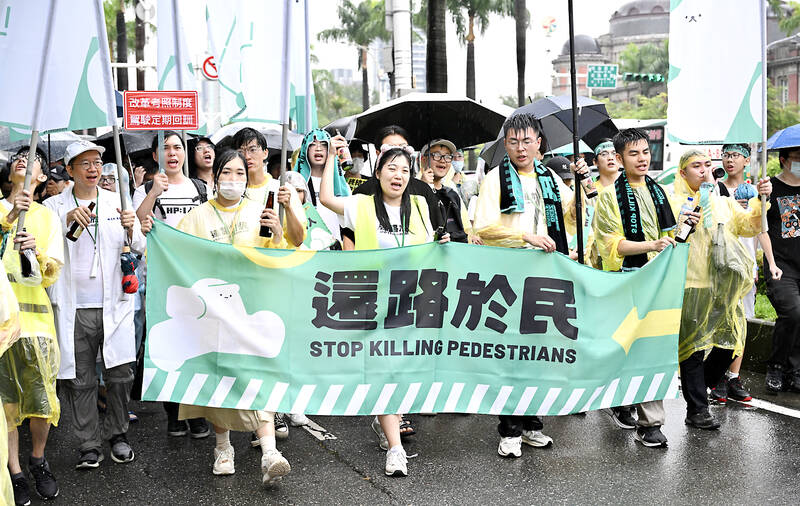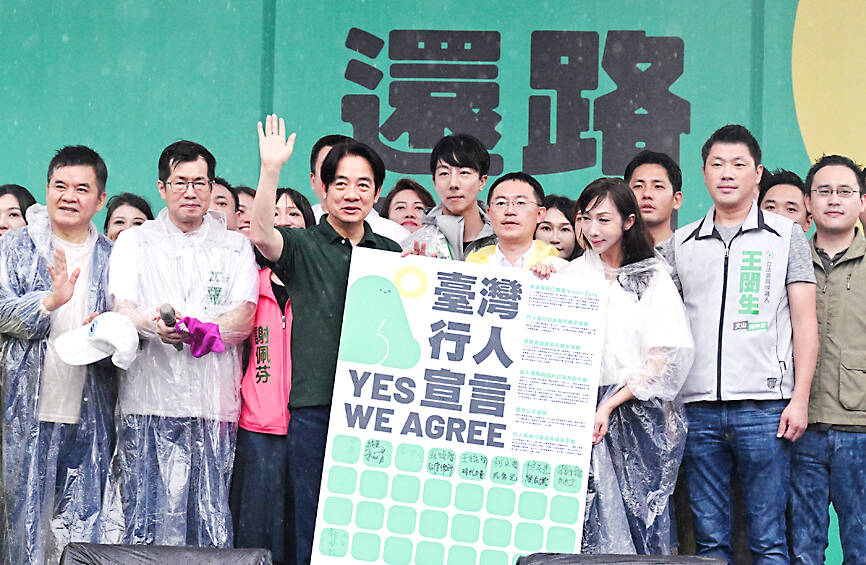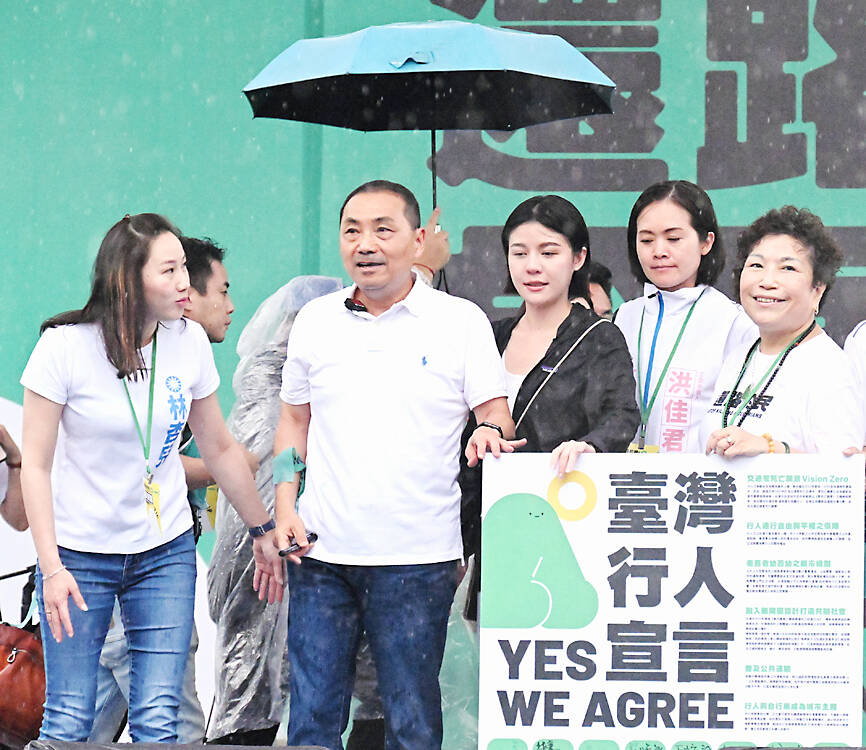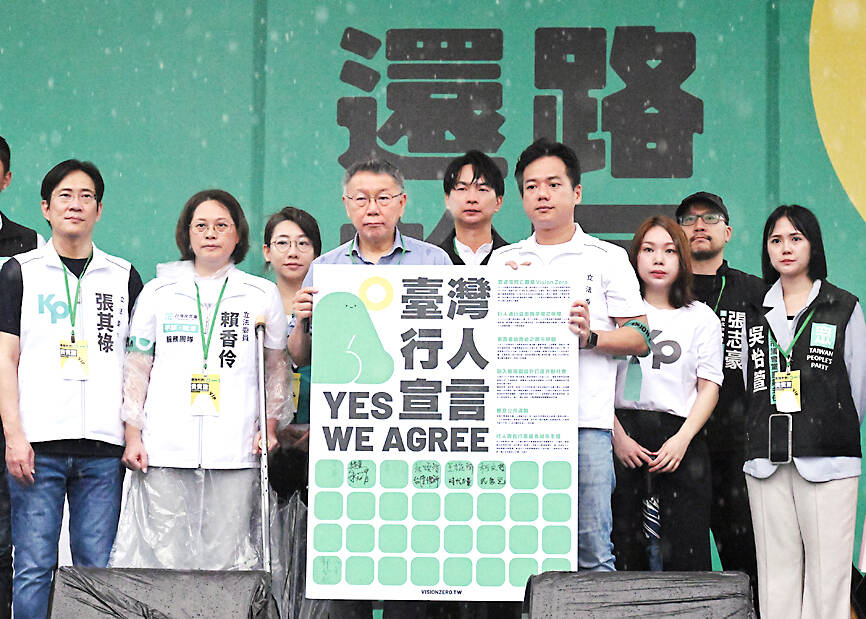The presidential candidates of three major parties in Taiwan, Hon Hai Precision Industry Co (鴻海精密) founder Terry Gou (郭台銘) and other parties yesterday signed a pledge to support and work toward “zero pedestrian deaths” by 2040 at a rally in Taipei.
The rally, called “Stop Killing Pedestrians,” was organized by civic group Vision Zero to urge the government to address the risks that pedestrians face in Taiwan, where more than 3,000 people die in traffic accidents every year.
Although the rally was disrupted by a sudden downpour yesterday afternoon, hundreds of people attended.

Photo: Lo Pei-de, Taipei Times
Chao Chia-ling (趙家麟), a professor of landscape architecture at Chung Yuan Christian University who has been raising awareness about pedestrian safety for more than 20 years, said the event was organized entirely by concerned citizens.
“I was surprised that a rally for the same cause that was held in Kaohsiung on July 22 was organized by high-school students,” Chao said. “I have been talking for more than 20 years and I was very frustrated, but now we have hope. All we want is for our children, and even our children’s children, to live safely in urban areas.”
Vision Zero presented its key appeals to the government, which included comprehensive facilities for pedestrians, new motor vehicle license tests, cracking down on motorists who do not yield for pedestrians and passing the draft transportation safety basic act.

Photo: Fang Pin-chao, Taipei Times
“We urge the government to listen to our appeals, show determination to change the transportation environment and fulfill the vision of ‘zero pedestrian deaths,’” Vision Zero said.
The number of pedestrian deaths should be halved by 2030, the group said.
Gou said he was nearly hit by large vehicles twice in the past six months when he was walking at night.

Photo: Fang Pin-chao, Taipei Times
Drivers need to stop, look and listen to ensure the safety of pedestrians, he said.
Representatives of Taiwan’s political parties all signed to support Vision Zero’s appeals.
Vice President William Lai (賴清德), the Democratic Progressive Party’s presidential candidate, vowed to thoroughly enforce the draft road transportation safety basic act and work with opposition parties and local government officials to improve safety at the 600 intersections where accidents most often occur in Taiwan.

Photo: Fang Pin-chao, Taipei Times
“I also support the cause of reducing pedestrian deaths by 50 percent by 2030 and reaching the goal of ‘zero pedestrian deaths’ by 2040,” Lai said.
New Taipei City Mayor Ho You-yi (侯友宜), the Chinese Nationalist Party’s (KMT) presidential candidate, said that Taiwan’s transportation safety issues need to be tackled by changing regulations and urban design plans.
“The lack of adequate separation between pedestrians and vehicles has caused chaos on the roads. We pledge to fulfill the appeals and conduct a thorough review of traffic signals, signage and demarcations around the country,” he said.

Photo: Fang Pin-chao, Taipei Times
Taiwan’s People Party Chairman and presidential candidate Ko Wen-je (柯文哲) said that Japan has a population five times larger than that of Taiwan, and yet Taiwan’s traffic-related deaths are five times higher than Japan’s.
“The current administration seems to think the way to address the road safety issues is to spend tons of money. However, it has generated only limited effects,” Ko said. “They should really look at numbers and address the fundamental issues.”
New Power Party Chairwoman Claire Wang (王婉諭) said the increase in pedestrian deaths was the result of the negligence of President Tsai Ing-wen’s (蔡英文) administration.
“Vice President Lai should consider the consequences of having subscribed to wrong solutions ... and refusing to change policies in the past seven years,” she said.
Minister of Transportation and Communications Wang Kwo-tsai (王國材) was booed while walking onto the stage to address the rally.
He said it is his responsibility to create a safe transportation environment, and bowed and apologized for past shortcomings.
“I will respond to each and every appeal, and incorporate them into transportation safety policy. The draft road transportation safety basic act will address relevant issues from the Cabinet level and clearly lists the responsibilities of the central government,” he said.

SECURITY: As China is ‘reshaping’ Hong Kong’s population, Taiwan must raise the eligibility threshold for applications from Hong Kongers, Chiu Chui-cheng said When Hong Kong and Macau citizens apply for residency in Taiwan, it would be under a new category that includes a “national security observation period,” Mainland Affairs Council (MAC) Minister Chiu Chui-cheng (邱垂正) said yesterday. President William Lai (賴清德) on March 13 announced 17 strategies to counter China’s aggression toward Taiwan, including incorporating national security considerations into the review process for residency applications from Hong Kong and Macau citizens. The situation in Hong Kong is constantly changing, Chiu said to media yesterday on the sidelines of the Taipei Technology Run hosted by the Taipei Neihu Technology Park Development Association. With

CARROT AND STICK: While unrelenting in its military threats, China attracted nearly 40,000 Taiwanese to over 400 business events last year Nearly 40,000 Taiwanese last year joined industry events in China, such as conferences and trade fairs, supported by the Chinese government, a study showed yesterday, as Beijing ramps up a charm offensive toward Taipei alongside military pressure. China has long taken a carrot-and-stick approach to Taiwan, threatening it with the prospect of military action while reaching out to those it believes are amenable to Beijing’s point of view. Taiwanese security officials are wary of what they see as Beijing’s influence campaigns to sway public opinion after Taipei and Beijing gradually resumed travel links halted by the COVID-19 pandemic, but the scale of

A US Marine Corps regiment equipped with Naval Strike Missiles (NSM) is set to participate in the upcoming Balikatan 25 exercise in the Luzon Strait, marking the system’s first-ever deployment in the Philippines. US and Philippine officials have separately confirmed that the Navy Marine Expeditionary Ship Interdiction System (NMESIS) — the mobile launch platform for the Naval Strike Missile — would take part in the joint exercise. The missiles are being deployed to “a strategic first island chain chokepoint” in the waters between Taiwan proper and the Philippines, US-based Naval News reported. “The Luzon Strait and Bashi Channel represent a critical access

Pope Francis is be laid to rest on Saturday after lying in state for three days in St Peter’s Basilica, where the faithful are expected to flock to pay their respects to history’s first Latin American pontiff. The cardinals met yesterday in the Vatican’s synod hall to chart the next steps before a conclave begins to choose Francis’ successor, as condolences poured in from around the world. According to current norms, the conclave must begin between May 5 and 10. The cardinals set the funeral for Saturday at 10am in St Peter’s Square, to be celebrated by the dean of the College